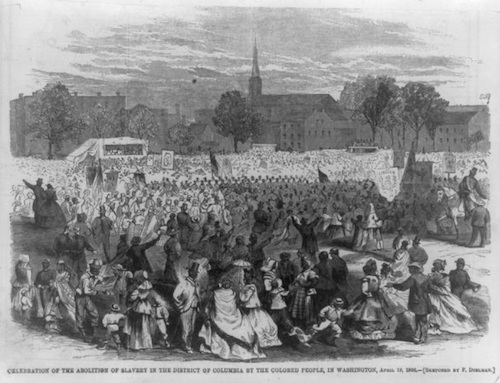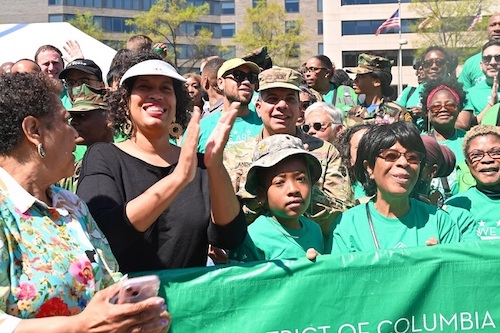Peirspictiochtai Ar An Saol
Juneteenth
Emancipation Celebrations
Part Three
 According to a statement from the Library of Congress, this sketch showed the "Celebration of the abolition of slavery in the District of Columbia by the colored people, in Washington, April 19, 1866." (The sketch was produced by F. Dielman, published on May 12, 1866, and provided courtesy of the Library of Congress.)
According to a statement from the Library of Congress, this sketch showed the "Celebration of the abolition of slavery in the District of Columbia by the colored people, in Washington, April 19, 1866." (The sketch was produced by F. Dielman, published on May 12, 1866, and provided courtesy of the Library of Congress.)
Some enslaved people in the United States of America had been freed from bondage by official actions of individual states and commonwealths prior to the American Civil War. The dates of the official actions as well as for the timing of emancipation varied for the different jurisdictions. In some cases, emancipation was based on the age of the human being held in bondage.
The Federal government also took official action to free enslaved people.
During the American Civil War, the United States Congress passed legislation that freed slaves in the District of Columbia. President Abraham Lincoln signed this legislation – The District of Columbia Compensated Emancipation Act – into law on April 16, 1862.
"It provided for immediate emancipation, compensation to former owners who were loyal to the Union of up to $300 for each freed slave, voluntary colonization of former slaves to locations outside the United States, and payments of up to $100 for each person choosing emigration," according to a statement from The United States National Archives and Records Administration (National Archives). "Over the next nine months, the Board of Commissioners appointed to administer the act approved 930 petitions, completely or in part, from former owners for the freedom of 2,989 former slaves."
Please note that according to a statement from the District of Columbia, 3,100 individuals held as slaves were set free through emancipation. Another report had the total number of persons freed to be closer to 3,200 people.
Please also note that when the law referenced individuals "choosing emigration," the law specifically mentioned emigration to two countries: "the Republics of Hayti [Haiti] or Liberia."
As word spread of their emancipation, newly-freed slaves celebrated in the District.
The Reading Daily Times (using language that reflected the times) reported on April 18, 1862, that the African Americans were celebrating the end of slavery in the District: "Celebration – The colored people of this city, will fire a hundred guns to-day, in honor of the passage and approval of the emancipation bill in the District of Columbia."
On April 23, 1862, the National Republican printed a front-page news article that was entitled "Emancipation In The District." Portions of this news article are as follows:
"The Washington correspondent of the New York Evening Post thus notices the feeling manifested by the colored people of this city on the subject of emancipation:"
"'The colored people have a jubilee to-day (Sunday) – not a set day of rejoicing, but the gathering at the colored churches is the occasion for loud manifestations of delight. Last Sunday [April 20, 1862] it was almost impossible for them to restrain their gratitude and joy. Every colored clergyman prayed about the great event, and every allusion to the subject, whether in prayer or sermon, was sure to bring down a shower of 'amens.' It is now proposed by the colored men, or their principal men in the District, to set apart some day in the week for a grand celebration of the great event [emancipation].'"
On May 2, 1862, the National Republican included a news article entitled "A Thanksgiving Day."
"Yesterday was set apart by various colored churches as a day of Thanksgiving, in view of the passage of the act of emancipation, and there were large gatherings in all of them, both in the day and evening," the newspaper reported. "We never witnessed a more sincere, heartfelt outpouring of humble hearts, in devout gratitude and praise, than was seen yesterday. It was a day of jubilee."
"Talk about the slaves not desiring the rich boom of freedom," the news article continued. "Let all doubters visit the assemblages of our colored people, at any time since the passage of that act, and his scepticism will vanish instanter. A more grateful people does not live on the face of the earth than the manumitted [freed] slaves of this District, at the present time."
These celebrations, organized by African Americans freed from slavery, took place more than three years prior to Juneteenth in Galveston, Texas.
The U S Congress passed an additional piece of legislation regarding emancipation in the District on July 12, 1862.
According to a statement from the National Archives, this supplemental law "…covered another type of claim, allowing slaves whose masters had not filed for compensation to do so."
"An important factor in deciding claims under this Act was that the testimony of both blacks and whites was accepted," the statement from the National Archives continued. "Now, if an owner challenged a slave who petitioned for freedom, the testimony from both was given equal weight, a sharp departure from the previous legal practice in which slaves or freed blacks could not testify against whites."
On April 16, 1863, the Evening Star newspaper in Washington included a note dated April 15, 1863: "Emancipation Celebration. – A demonstration to celebrate the anniversary of the emancipation of the slaves of the District of Columbia will be held at the Fifteenth Street Presbyterian Church exercises commencing at 8 o'clock, on Thursday evening, 16th inst."
"A number of distinguished speakers, white and colored, will be in attendance and will deliver addresses," the note continued. "Admission 15 cents; proceeds of which are for the relief of destitute contrabands."
The next day. the Evening Star included details about "The Emancipation Jubilee Last Night" in its newspaper.
The celebrations in 1863, organized by African Americans freed from slavery, took place more than two years prior to Juneteenth in Galveston, Texas.
Annual celebrations of emancipation continued in the District for a number of years for decades, according to a number of news reports.
Today, each April 16 is celebrated as "Emancipation Day" in the District of Columbia. This date has been an official holiday in the District since 2005.
The next edition of Peirspictiochtai Ar An Saol will detail some aspects of emancipation of slaves in the United States of America through the 13th Amendment of the U S Constitution as well as through treaties between the United States of America and Native American nations in what is today Oklahoma.
 Major General John Andonie, Commanding General of the District of Columbia National Guard, and the 257th Army Band joined Muriel Bowser, Mayor of Washington, for the 2024 Emancipation Day Parade and concert. (The photograph was produced by Master Sergeant Arthur Wright and provided courtesy of the U S Air National Guard, April 14, 2024.)
Major General John Andonie, Commanding General of the District of Columbia National Guard, and the 257th Army Band joined Muriel Bowser, Mayor of Washington, for the 2024 Emancipation Day Parade and concert. (The photograph was produced by Master Sergeant Arthur Wright and provided courtesy of the U S Air National Guard, April 14, 2024.)
Peirspictiochtai Ar An Saol – Gaelic – Irish – for "Perspectives On Life" is a column focused on aspects of accountability and responsibility as well as ways people look at life.
Contact Richard McDonough at
© 2024 Richard McDonough









